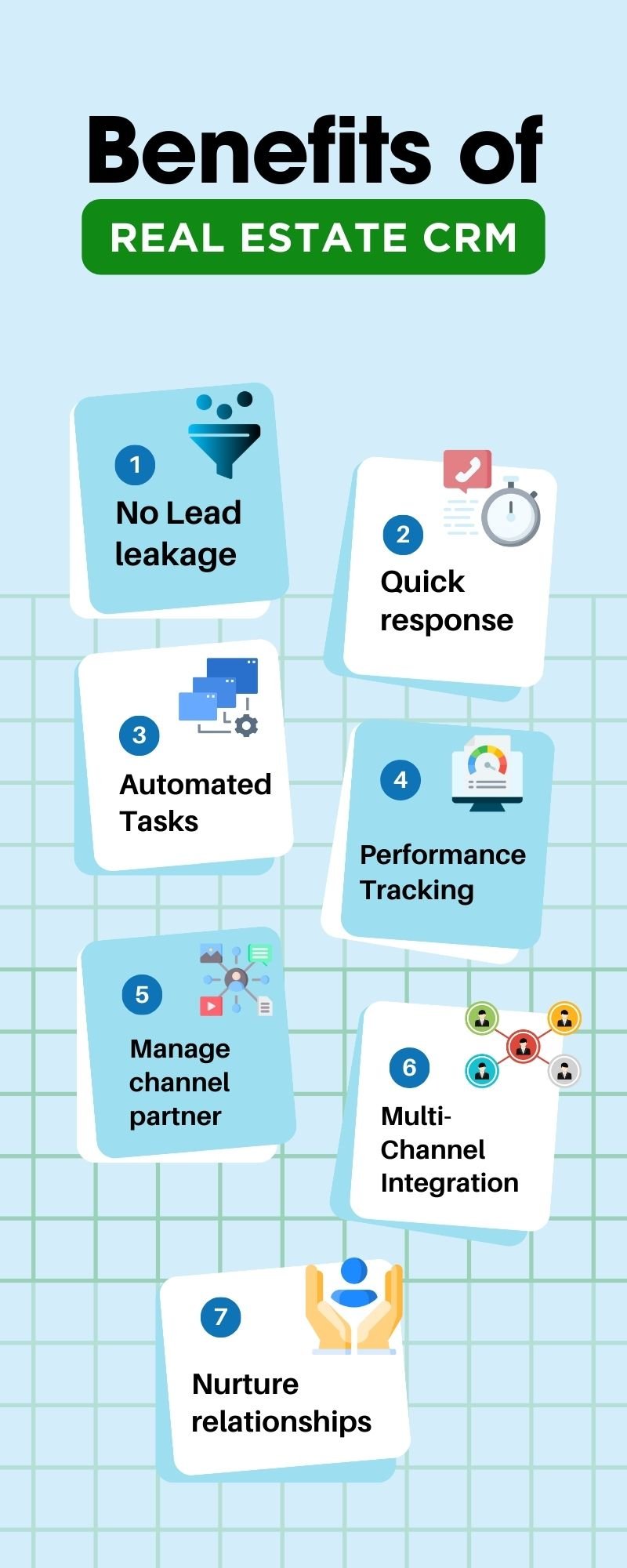7 Benefits of CRM for Real Estate Business

Realtors, brokers, and property managers lead incredibly busy and dynamic work lives. 🏃♂️🏢They are constantly juggling tasks such as showing properties, negotiating deals, and handling a flood of client inquiries. Their days are filled with back-to-back appointments, open houses, and paperwork. 📞🏠📝Property managers, on the other hand, oversee the maintenance and operation of rental properties, dealing with tenant issues, coordinating repairs, and ensuring everything runs smoothly. They are always on the go, responding to emergencies, and keeping properties in top shape. The fast-paced nature of their jobs demands excellent time management, multitasking skills, and a dedication to providing top-notch service, making their work both challenging and rewarding.
What is real estate CRM and why do agents use CRM for Real Estate?
A Real Estate CRM (Customer Relationship Management) is a specialized software tool designed to help real estate agents manage their interactions with clients and potential buyers. It helps agents keep track of leads, schedule follow-ups, manage appointments, and organize client information all in one place. Agents use a CRM for real estate to ensure no potential lead is overlooked, respond quickly to inquiries, streamline their daily tasks, and maintain strong relationships with clients. This not only boosts their efficiency and productivity but also enhances customer satisfaction, leading to more successful sales and long-term client loyalty.
Some of the important benefits of Real Estate CRM

No Lead leakage
One of the biggest challenges real estate agents face is losing potential leads or clients due to disorganization or manual processes. In the past, agents had to rely on methods like spreadsheets or paper files to track leads, which made it easy for some to slip through the cracks unnoticed. This is what’s known as “lead leakage.”
A real estate CRM solves this problem by providing a centralized system to automatically capture and store lead information from all sources – your website, online listings, marketing campaigns and so on. No matter where a new lead comes from, the Lead Management System in CRM ensures it gets recorded so you never miss an opportunity.
For example, with a CRM like SalesTown, you can easily collect leads from your real estate website forms, social media campaigns, online advertising, Real Estate portals, and more – it all gets funneled into one organized database so you can promptly follow up.
Quick Response
“Quick Responses” in a real estate CRM refer to the system’s ability to help agents reply to client inquiries swiftly and efficiently.
SalesTown lets you create pre-built templates for common messages you send to clients. These templates, like mini-shortcuts, can be customized with your touch. Need to follow up with a client? Pick a pre-written template for scheduling a call or sending property updates. This saves you time crafting emails from scratch and ensures you stay responsive to clients.
Automated Tasks
“Automated Tasks” in a real estate CRM refer to the system’s ability to handle routine and repetitive tasks automatically, without the need for manual input. For real estate agents, this means that activities like sending follow-up emails, scheduling property viewings, setting reminders for client meetings, and updating contact information can be managed by the CRM.
A CRM like SalesTown can help you with features like intelligent lead distribution to automatically assign new leads, stage followers to notify relevant team members as deals progress, and stage change-due alerts to ensure timely follow-ups based on your schedules. With these automated capabilities, SalesTown CRM helps real estate teams stay organized, responsive, and focused on closing more deals.
Performance Tracking
One of the major advantages of using a CRM for your real estate business is the ability to easily track and analyze your team’s performance metrics. Instead of manually compiling data from disparate sources, the CRM centralizes all your leads and deals information in one place. This allows you to quickly generate reports on key performance indicators like lead response times, number of new leads per agent, deals closed versus targets, commission earnings, and much more. With this data at your fingertips, you can identify which agents or marketing channels are the highest performers and which areas need improvement. The CRM reporting gives you transparency into what strategies are working and where bottlenecks exist in your sales process.
Manage Channel Partner
Managing channel partners in a real estate CRM involves overseeing the relationships with third-party entities like brokers, agents, or agencies who assist in selling or promoting properties. This entails keeping track of their performance, coordinating efforts on deals, and ensuring everyone involved is informed and aligned. A CRM like SalesTown CRM helps you manage these partnerships effectively and enables you to seamlessly share client information, documents, and updates with relevant partners as needed. You can easily loop them in, assign tasks, and monitor progress without losing track of important details.
Multi-Channel Integration
In today’s digital age, real estate leads and prospects can come from many different sources – your website, social media pages, Real Estate listing portals, advertising campaigns, and more. Trying to manually track and manage all these various lead channels is inefficient and risks missing important opportunities. A real estate CRM solves this by integrating and unifying your lead data from multiple platforms into one centralized system.
For example, when someone fills out a form on your website expressing interest in a property listed by givin thier detail, that lead gets automatically captured in the CRM. The same goes for social media interactions, online ad inquiries, or marketplace listing views – the CRM pulls in those leads seamlessly. This also ensures timely follow-up with them.
Having this multi-channel integration ensures no lead slips through the cracks, regardless of where that initial interest originated. It eliminates the need to juggle separate lists or manually transfer data between different tools and channels.
Nurture Relationships
“Nurturing relationships with clients” in a real estate CRM involves consistently engaging with clients to build trust and rapport over time. CRM like SalesTown facilitate this process by incorporating features like in-built email marketing, SMS marketing, and WhatsApp notifications. With these tools, real estate agents can stay in regular contact with clients, providing them with valuable information about properties, market updates, and personalized offers. By sending targeted emails, SMS messages, and WhatsApp notifications, agents can keep clients informed and engaged throughout their property buying or selling journey. This ongoing communication helps strengthen the relationship between the agent and the client, fostering loyalty and increasing the likelihood of successful transactions.
Accelerate Your Real Estate Success!
In the end, a powerful CRM like SalesTown CRM is extremely valuable for real estate professionals. It brings together all the important tasks and information needed to manage leads, clients, and deals into one easy-to-use system. SalesTown CRM helps realtors stay organized, communicate effectively with clients, and market their services more successfully. By using SalesTown CRM, realtors can boost their sales and never miss out on potential opportunities. In short, SalesTown CRM is a must-have tool that simplifies the real estate business and drives better results.
Take control of your leads, deals, and properties with SalesTown CRM. Sign up for a free demo.
